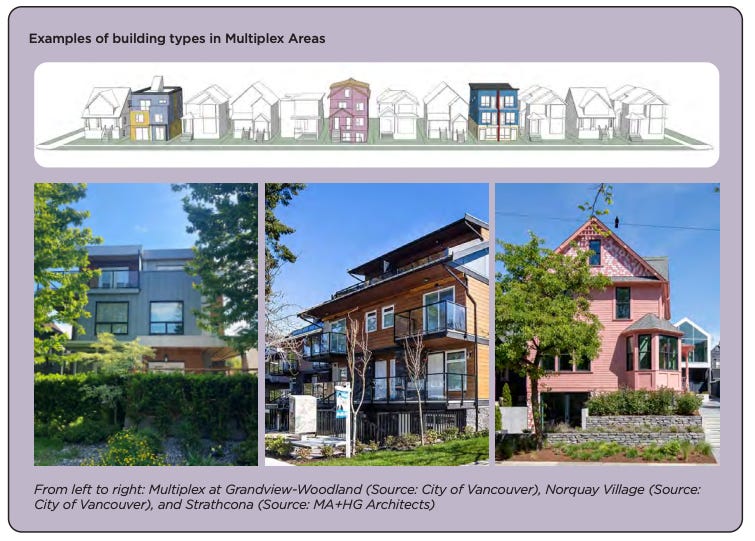Vancouver is an Endangered Species
City Conversation #62: The proposed Vancouver Plan has no place for most of what made our city the model for livability.
July 3, 2022—Part 1 of this commentary about the proposed Vancouver Plan talked about its erasure of all of the city’s 22 traditional neighbourhoods. This Part 2 looks at the proposed alternative. Introduced in final form just a week ago, the Plan comes before Council on July 6th —if passed it will quickly become our Official Community Plan (OCP).
The proposed Vancouver Plan’s Land Use Strategy recognizes no history, no local character (pp. 54-55)—neighbourhood names and borders added by author
“Why is it still so smudgy?” I asked myself as I pored over the proposed Vancouver Plan’s Land Use Strategy map. The final version of the 166-page Plan only arrived in Council’s in-email one week before it’s to be considered for adoption on July 6th. I had attended a one hour media briefing the afternoon before the official unveil, on behalf of CityHallWatch, for whom I am a guest writer. Staff were looking to prime media a day in advance of tabling the document with City Council.
Having already identified the erasure of Vancouver’s historic neighbourhoods, I was now focused on what would replace them. I was briefly excited when I finally found the Plan’s Land Use Strategy Map on pp. 54-55. However, my enthusiasm was dashed when I realized that this exceedingly complicated map excluded existing neighbourhood names and boundaries—so I added them to see if that created a more comprehensible map. Sadly, no.
The Plan relies on generic aerial views and illustrative photos on pp. 54-67 to describe the six types of “neighbourhood” that replace the 22 existing, historic city neighbourhoods.
Six neighbourhood types replace 22 existing neighbourhoods (p. 50)
Initially, I was going to identify which of these proposed neighbourhood types was planned within each existing neighbourhood. A few hours and a headache later, I’ve decided it would be better to identify in summary terms what’s coming in your neighbourhood if this Plan is passed. My summaries are by neighbourhood type as proposed in the Plan. Note, these descriptions exclude any of the spot rezonings that may have already been approved for your neighbourhood:
Image above Covers the Broadway Plan areas + Strathcona + Downtown including DTES + West End
Image above Covers Oakridge + surroundings
Image above Covers: Kitsilano & West Point Grey west of Broadway Plan, 16th down to 1st, + 3 blocks either side of Hastings through Grandview Woodland and Hastings Sunrise, + 3 block radius around SkyTrain stations, + 3 blocks either side of 41st through Dunbar-Southlands, Arbutus Ridge, Kerrisdale, Shaughnessy, South Cambie & Oakridge, + 3 blocks either side of 45th through Riley Park, Kensington Cedar Cottage, Renfrew Collingwood, Killarney, Victoria Fraserview and Sunset + north part of South Cambie + south part of Marpole
Image above Covers: West Point Grey W. 10th Ave., Dunbar 16th through 41st, Arbutus 16th through 41st, south Marpole, most of Killarney, Kensington Cedar Cottage around Kingsway, most of Riley Park. NOTE: Plan includes 7-12 storey high-rises locates one or two blocks away from arterials.
Villages are contained within Neighbourhood centres—too confusing to parse
Multiplex—whatever’s left over
The Plan is sufficiently confusing in its maps and graphics for me to suspect I’ve made some small errors here and there—apologies. It does make me wonder how anybody is supposed to figure out the details. Or maybe that’s the point.
When is a plan not a plan? When it leaves most things unplanned, subject to spot rezoning.
What does this all mean? Staff has used our existing 22-neighbourhood system when it suits the Plan’s words, especially the feel good word, neighbourhood, but is silent about erasing all but two of the existing neighbourhoods—and those two are the highest density areas of the city.
As the Vancouver Plan moves to first position in the longish list of planning efforts that staff want the existing Council to endorse before the next civic election, ask yourself why that is the case. Why can’t such a major plan be debated by the next Council? Why can’t Vancouver residents have input to the Plan, now that it has become so real, so fast? Pay attention to which politicians endorse the plan—they are the ones who disdain citizen input, else they would not rush this through.
Call to Action
For those citizens currently sitting on the sidelines, thinking “it doesn’t affect me,” know that the Vancouver Plan, which covers the entire city, will write the Broadway Plan’s high density concepts without further public input onto every quiet corner of every city block, every treed hill in every park, every close and distant vista in our decreasingly fair land. Please review the Vancouver Plan. Whether you agree with it or not, say so by the end of the day tomorrow, July 4th, else Council will not have time to read it before their meeting. Better yet, sign up before 8:30 am on July 6th to speak at the Council meeting. Not much time but the schedule is set by the Mayor and city staff for their convenience, not ours. There is no compelling reason for it to be considered before the next civic election.
If you want to know what spot rezonings are already approved or underway in your neighbourhood, contact me with your email and street address (so I can identify neighbourhood) and I will let you know what spot rezonings I’ve already found on the 380+ city websites I’ve searched. If you see a rezoning sign, photograph it and send it to me and I will confirm if I have it, add it if I don’t. Either way, I will keep you informed of any progress (?) or refinements I become aware of.
Vancouver’s civic election is October 15th of this year. Lots more damage can be done to our city before that date—and it will continue, and worsen, unless TEAM for a Livable Vancouver elects a majority (6 of 10) City Councillors—less than 6 and not much will change. If you are concerned that what you’ve just read is an example of what’s wrong with our city, and want to bring back its livability, join TEAM and work with us to restore Vancouver as a place we can all afford to call home.
Today’s question: Do you like the Vancouver Plan? Why or why not?
I read and respond to all comments made below. If you enjoyed this post, consider becoming a free subscriber to City Conversations at
I am a Vancouver-based architect, building envelope and building code consultant and LEED Accredited Professional (the first green building system). I am semi-retired for the moment, still teaching and writing, so not beholden to any client or city hall. These conversations mix real discussion with research and observations based on my 40+ year career including the planning, design and construction of almost every type and scale of project. I am the author of the award winning Amazon best seller “An Architect’s Guide to Construction.” I am also a member of TEAM for a livable Vancouver, a new political party dedicated to restoring a livable Vancouver starting with the 2022 civic election. Although I am not a candidate for TEAM or any other civic party, City Conversations are generally congruent with TEAM policy, so if you like the ideas that I’m writing about, please consider joining TEAM.













This council is in power and will use it to promote their agenda. This behaviour is to be expected but not rewarded.
The people who didn’t vote last time won’t vote this time. The more freebies and handouts offered the more votes “they” will receive!
We bought a house in a major road and now I hear people complaining that if social housing or low income (% of), goes in that “we” will be abusing the poor and low income people by housing them in a new building on a street where we have lived over 20 years. Not once has the city or any person ever considered the impact on “us” (home buyers) who paid fair market value to live here in spite of road noise!
I don’t like what is being done by the council I voted against and don’t believe their plan will work when 1/2 a duplex cost more than the original property sold for in most cases.
The plan will pass! The lowest common denominator will prevail and we will be told to be happy!
In no way was proper consultation done over this plan but did anyone expect it would be done? And now a SkyTrain will come in front of our home and although we carried the mortgage and risked potentially higher interest rates the whole time, the city believes we shouldn’t (developers should not) reap financial gains from having bought the place and developers who will do the work and carry more financial burden and risk!
The average person is none too bright and we are now not just pandering to the average we are catering to those who have contributed the least (exceptions granted for those with real problems who deserve our help and good faith), and we will not recover! It is the “tragedy of the commons” for our time!
Young people don’t know history and can’t even define what a “woman” is! I agree with Mark Twain on two points.
Land is the one thing they aren’t making any more of…,
We are all in the gutter of life, it’s just that some of us are looking up at the stars!
Well if being ignored ..must find 'possible' allies like ___<_ who advocate for the working poor and might be harder to ignore?
Even MetroVancouver has a lot of research material/ data on housing issues across Metro.
as do other municipal
planning departments...all are simmering in the same pot.
Municipalities having only limited taxing authority..Developers take advantage of that of course.
Trying to address an affordability crisis through suppy side economics has not worked in the past and will not now. Housing is not a commodity..it is a basic human need.
Schula Leonard